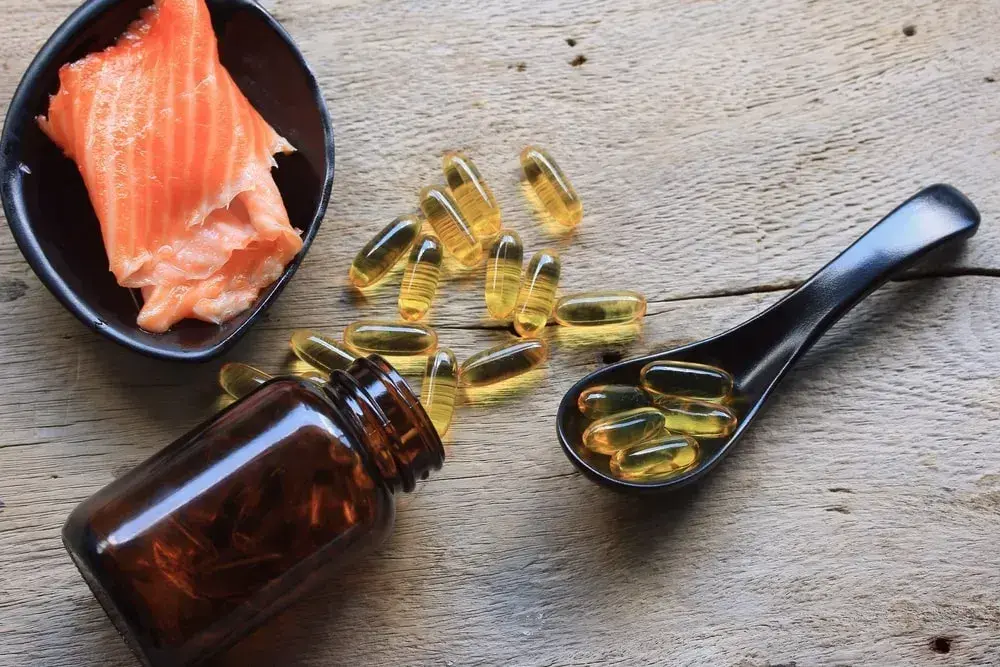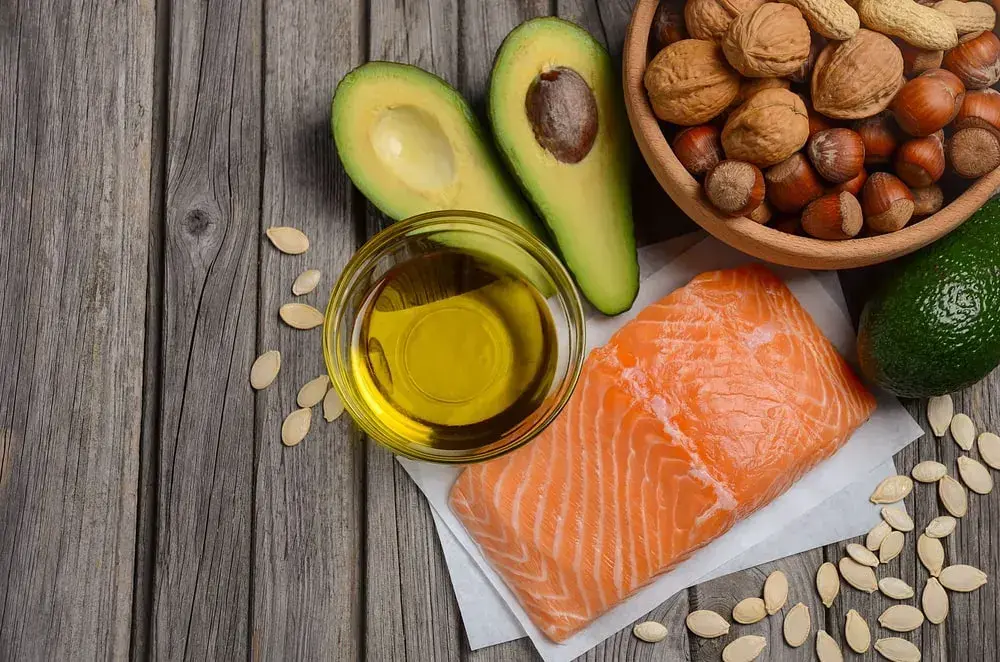7 min read
From The Doc: 7 Evidence-based Benefits Of Omega-3 Fatty Acids
Garcia Weight Loss
:
Jan 23, 2019 12:00:00 AM

/assets/images/provider/photos/2579776.jpg)
Dietary fats have had a bad reputation for many years. For the longest time, low-fat diets promised weight loss, and people were told that eating fats would lead to weight gain. But certain fats are actually necessary for facilitating many processes in the body, and may even help drive weight loss. You’ve probably already heard of omega-3 fatty acids, but how do these fats benefit your health? Are you getting enough omega-3s in your diet?
What are omega-3 fatty acids?
Omega-3 fatty acids are a type of unsaturated fat; specifically, they are polyunsaturated fatty acids (PUFAs). These fats have been widely studied and offer a number of important health benefits.
Unfortunately, most people don’t get enough omega-3s in their diets. Evidence suggests that we may be eating too much omega-6 fatty acids, and not nearly enough omega-3. Some experts believe that humans evolved on a diet that included omega-6 and omega-3 in equal amounts. However, this is far from the case with today’s modern diet.
Omega-3s are broken into different types of fat. Eleven types of fat have been discovered to date, but the three most studied types of omega-3 fatty acids are:
- Alpha-linolenic acid (ALA). This fat is found in seeds and nuts such as flaxseed and flaxseed oil, walnuts, chia seeds, and pumpkin seeds
- Docosahexaenoic acid (DHA), which is found in eggs, fatty fish, and algae
- Eicosapentaenoic acid (EPA), which, like DHA, is found in fatty fish and algae
Within these types, EPA and DHA are better options for a health boost. While ALA is found in many healthy foods and is a good source of energy, the body must convert ALA into EPA, and then into DHA in order to use it. This only happens with a small amount of the ALA you consume.
It’s more efficient to eat foods or take supplements that already contain EPA and DHA if you’re looking for specific omega-3 benefits. Fish are the most well-known source of EPA and DHA, and get their omega-3 content from eating microalgae. Microalgae contain these omega-3s, which then accumulates in the fatty tissue of the fish. That’s why eating fatty fish is a great way to get omega-3s, and why high-quality fish oil supplements are also a good source of omega-3s.
Don’t I need to avoid all fats to lose weight?
Avoiding all fats isn’t necessary, and can actually be detrimental to your overall health and weight-loss efforts. That being said, all fats are not created equal. Some fats, like saturated fats, should be consumed in small amounts in the form of foods that offer other health benefits, such as eggs or grass-fed beef.
Additionally, some fats can be made by the body and used efficiently in ways the body requires. Other fats cannot be made by the body, and must be obtained through diet and nutritional supplementation. These important fats are called essential fatty acids, or EFAs. Getting enough omega-3s — which is one kind of EFA — should be a major focus in any healthy lifestyle.
How does omega-3 help you lose weight?
Evidence reveals that low-fat diets aren’t usually successful, and don’t work as well for weight loss as other methods of calorie restriction. The body uses all fats for important processes — including “unhealthy” saturated fats. Fats also help you stay full for longer periods of time since your body digests them more slowly than other foods, and because they won’t cause blood sugar crashes. As a result, a diet high in omega-3s can help you lose excess weight.
What are the benefits of omega-3 fatty acids?
What exactly can omega-3 fatty acids do for your body? Omega-3s are important for proper function of cell membranes in the body. For instance, DHA is added to infant formula for its role in a baby’s brain and eye development. It’s also found naturally in human breast milk. For men, omega-3s are crucial to fertility, as they are needed for healthy sperm.
Other benefits of omega-3s include reducing depression and anxiety, reducing the risk of heart disease, preventing cognitive decline, and reducing inflammation. Keep reading to learn about the many benefits of omega-3 fatty acids.
1. How can omega-3 help with depression and anxiety?
We know that the brain requires omega-3s for proper function, and it appears that eating enough omega-3s can also help prevent or improve symptoms of depression and anxiety.
Evidence suggests that the benefits of omega-3s could serve as a future treatment for depression, and that EPA is effective as an antidepressant. Depression is a complex and serious condition that requires a doctor’s care. However, those who suffer from depression can add omega-3s to their diet in addition to therapy and/or medications. Omega-3s also have similar positive effects on those who suffer from anxiety, and are shown to effectively improve symptoms.
2. How can omega-3 reduce heart disease risk?
Heart disease is currently the leading cause of death in the U.S. and kills more than 600,000 people every year. Omega-3s can help you reduce your risk.
Specifically, EPA and DHA have been shown to reduce the risk of heart disease, while other evidence reveals that a higher intake of fish is associated with a lower risk of heart failure and sudden cardiac death. Omega-3s can also help reduce the risk of cardiovascular events.
Keep in mind that it’s also important to follow your doctor’s instructions to reduce the risk of heart attack and stroke. This may include eating a healthy diet and exercising regularly. Omega-3s are a great way to give your heart a healthy boost naturally.
3. How omega-3s improve metabolic syndrome
Omega-3s have been shown to offer major benefits for people who suffer from metabolic syndrome, which is a group of conditions that increase a person’s risk of serious medical conditions including type 2 diabetes and heart disease. Metabolic syndrome affects nearly one-quarter of American adults and leads to a higher risk of heart attack and stroke. Symptoms of metabolic syndrome include high blood pressure, high blood sugar, excess belly fat, and high cholesterol.
Omega-3 supplements can help people with metabolic syndrome lose significantly more weight and lower heart disease risk factors when compared to placebos. The anti-inflammatory action of omega-3s can also help people with metabolic syndrome lower their risk of health complications.
4. How omega-3 helps the brain
Low intake of omega-3s can equate to a higher risk of dementia and cognitive decline. Omega-3 fatty acids may be effective at preventing and treating Alzheimer’s disease, with their safety, low cost, and other health benefits making them an attractive option as a cognitive health measure. DHA has been shown to be essential for supporting healthy brain function, and also appears to provide protection against the onset of Alzheimer’s.
Presently, there are no known medical cures for Alzheimer’s disease and dementia. However, consuming a higher amount of omega-3s may be an effective way to keep the brain healthy for as long as possible.
5. How does omega-3 reduce inflammation?
Omega-3s have anti-inflammatory properties that can help prevent and improve serious health conditions caused by chronic inflammation. Omega-3s reduce inflammation by inhibiting enzymes in the body that cause tissue damage and swelling, and that contribute to inflammation. Eating a diet high in omega-3s can help you lower your risk of conditions linked to chronic inflammation such as high blood pressure, heart disease, and cancer.
6. Are omega-3 fatty acids good for skin?
DHA plays a major role in cell membrane health, and allows promotes soft, youthful-looking skin. EPA also contributes to good skin health by reducing acne and premature signs of aging such as fine lines and wrinkles, and helps balance your skin’s pH to reduce oiliness. Omega-3s can even prevent the loss of collagen after you’ve been spending time in the sun.
7. Are omega-3 fatty acids good for joints and bones?
Omega-3s have been shown to increase grip strength and reduce joint pain, which is common among those who suffer from arthritis. Omega-3s can also boost the amount of calcium in your bones to improve bone strength and reduce the risk of osteoporosis, which is common among older adults.
What are the best omega-3 foods?
There is no established recommended intake for EPA and DHA. Focus on eating foods that contain EPA and DHA, and consider taking an omega-3 supplement to boost your intake of these healthy fatty acids.
The following foods can increase your intake of DHA and EPA:
- Fatty fish (see below)
- Eggs
- Grass-fed beef (avoid grain-fed beef, which contains small amounts of omega-3 and high amounts of unhealthy fats)
- DHA-fortified foods and beverages
Plenty of healthy foods also contain ALA. These foods include:
- Nuts and seeds such as flaxseed, chia seeds, hemp seeds, and walnuts
- Flaxseed oil
- Leafy greens such as kale and spinach
What fish have omega-3?
Omega-3s can be found in fatty fish such as:
- Salmon
- Tuna
- Mackerel
- Lake trout
- Herring
- Anchovies
- Sardines
Aim to eat fatty fish at least two times per week. One serving of fatty fish equates to roughly 3.5 ounces cooked, or about three-fourths cup of flaked fish. If you have access to wild-caught fish, stick to those types of fish before buying canned fish.
Some types of fish can be high in mercury. Pregnant women and children should avoid fish with a high mercury potential such as shark, swordfish, and king mackerel.
Are omega-3 supplements necessary?
Omega-3 fish oil is one of the most important supplements you can take. When choosing an omega-3, it’s important to consider both quality and cost. Research shows that supplementing with omega-3 fatty acids provides numerous benefits, including:
- Lower blood pressure
- Increased HDL (“good”) cholesterol
- Reduced risk of heart attack
- Lower levels of stress hormones, which is critical for weight loss
- Promotion of muscle development
- Reduced joint pain and swelling
- Improved mental health / lower risk of depression
- Lower risk of certain types of cancer
Your source of omega-3s should be of the highest quality to ensure it’s clean, pure, and concentrated. We offer a premier supplement that delivers one of the highest quality omega-3s on the market at an affordable price.
A minimum dose of 2.7 grams of omega-3s per day is recommended to benefit from anti-inflammatory therapeutic effects. Make sure that your supplement has been tested by the two best independent testing sources available: International Fish Oil Standards (IFOS) and United States Pharmacopeia (USP).
Our Omega-3 Pro has received 5 out of 5 stars from IFOS and is the only supplement of its kind to achieve verification, which is the most rigorous quality assurance verification in the world. When using fish oil supplements, keep in mind that although some people will experience immediate improvement within the first two weeks, positive results may not be noticeable for about 4 to 8 weeks. In some cases, results may take up to 12 weeks.
It takes time for the anti-inflammatory effects of EPA — the primary active ingredient in Omega-3 Pro — to fully deliver its healing properties throughout the body. You can further improve your results by avoiding inflammatory foods such as sugar, fried foods, processed foods, wheat, and dairy, and by eating an anti-inflammatory diet.
Should omega-3 be taken with food?
Read the label on your omega-3 supplements to determine whether they should be taken with food or on an empty stomach. Ideally, fish oil supplements should be taken with meals that contain fats to help your body better absorb the supplement. Foods that contain healthy fats such as eggs, olive oil, and avocados can help trigger the release of enzymes that deliver these nutrients directly to your cells.
Omega-3s: more benefits yet to come
There are many other possible benefits to omega-3s that don’t yet have existing studies to back them up. However, it’s safe to say that omega-3s should be a part of everyone’s diet — especially those who are trying to lose excess weight. As omega-3s continue to be studied, we are confident that more advantages will be realized.
Need help losing weight or meeting other health goals? Garcia Weight Loss and Wellness offers personalized weight-loss plans that help address the underlying factors that can make weight loss difficult, including nutritional deficiencies or chronic inflammation. Contact us today for your no-cost consultation!



